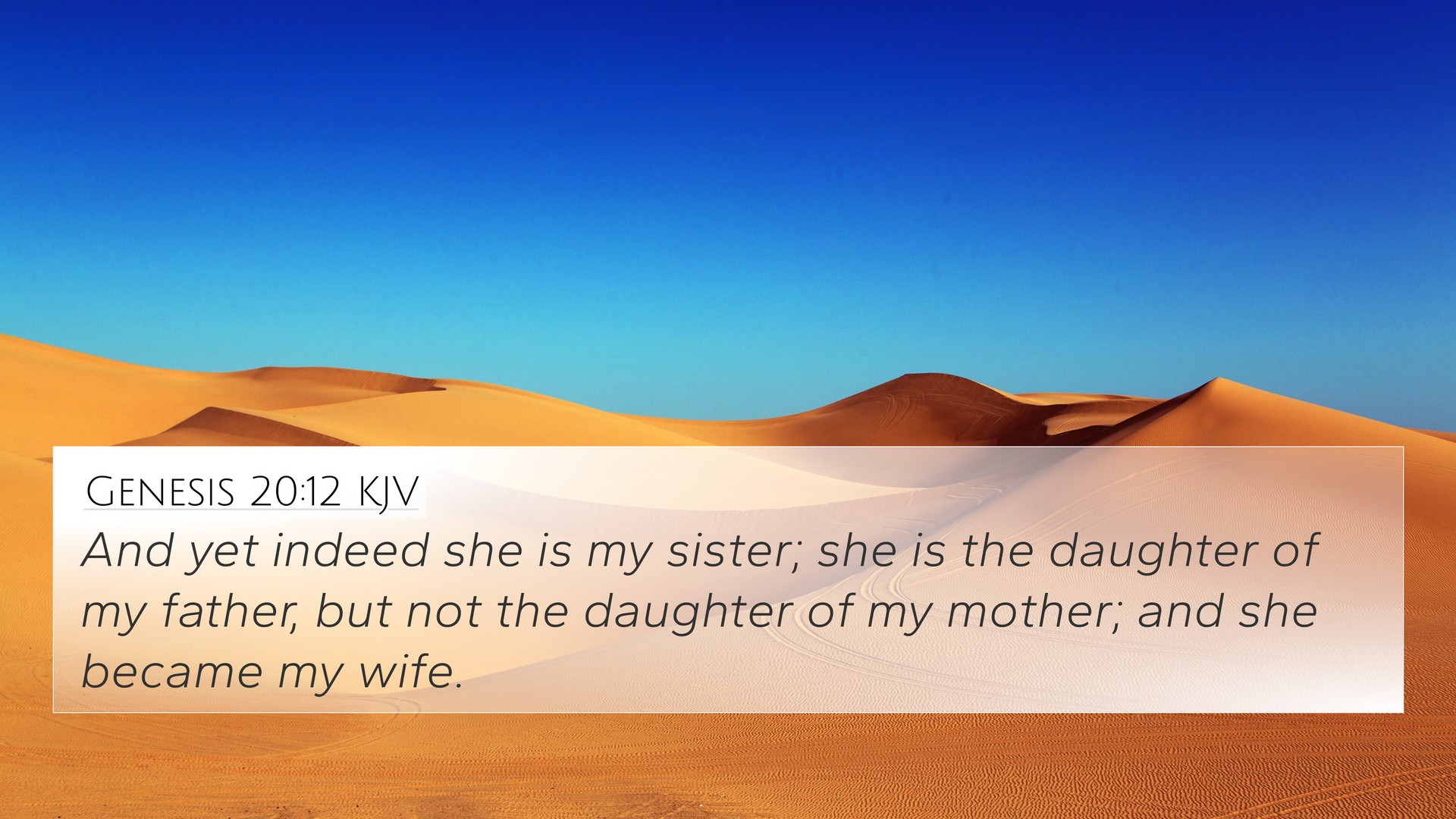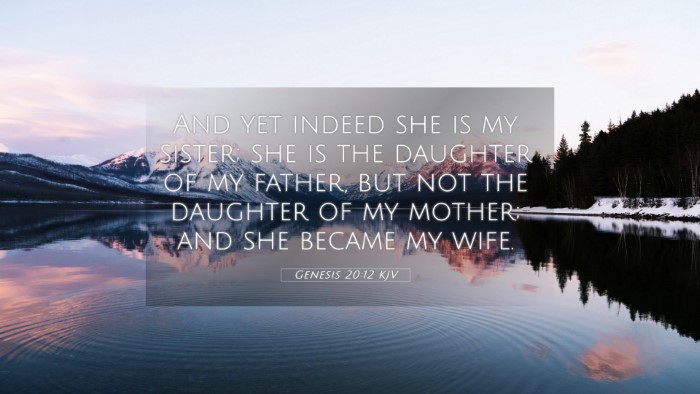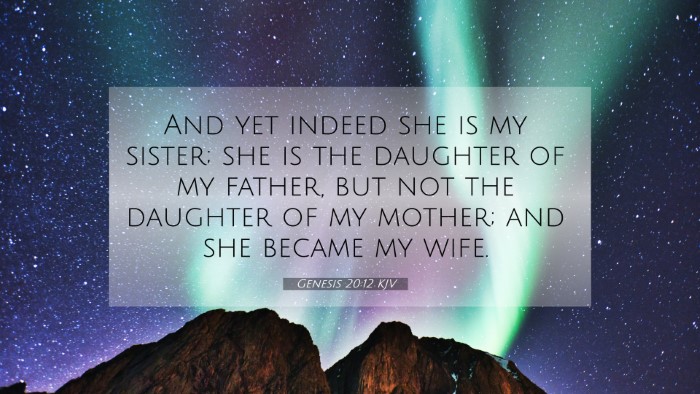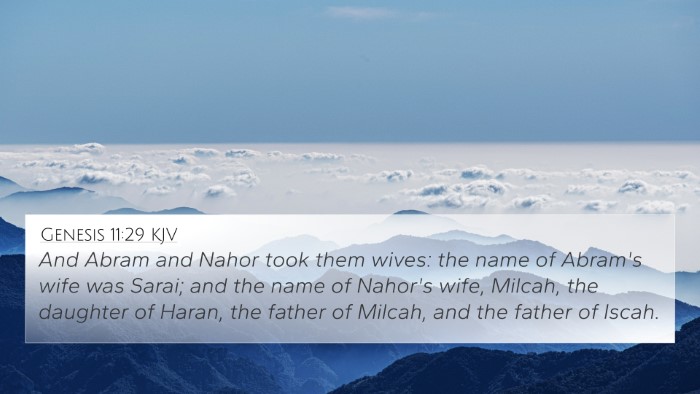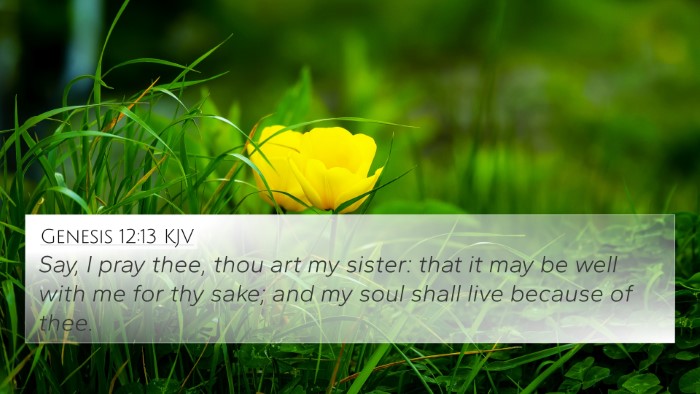Understanding Genesis 20:12
Genesis 20:12 states: "And yet indeed she is my sister; she is the daughter of my father, but not the daughter of my mother; and she became my wife."
Summary of the Verse
This passage highlights a pivotal moment in the narrative of Abraham, showcasing his attempt to protect himself by masking the truth about his relationship with Sarah. Abraham's statement contains both truth and deception, as it reveals relational ties while omitting the full context of their marriage. The verse illustrates themes of familial loyalty and the complexities of truth-telling in precarious situations.
Commentary Insights
- Matthew Henry: Henry suggests that Abraham's fear led him to adopt a lie to safeguard his safety. He emphasizes that despite the human inclination towards fear, God maintains His protective care over His own.
- Albert Barnes: Barnes notes that the complexities of family relationships can sometimes lead individuals to make unwise decisions. He warns against compromising truth for self-preservation and highlights how God can intervene even amidst human deception.
- Adam Clarke: Clarke discusses the cultural and societal implications surrounding Abraham’s claim. He explains how such practices were not uncommon in a historical context where survival often meant navigating perilous circumstances with caution.
Connections to Related Bible Verses
This passage can be better understood through various cross-referenced scriptures that evaluate its themes and underlying truths:
- Genesis 12:13: This verse depicts a similar situation where Abraham instructs Sarah to say he is her brother, showcasing a recurring pattern of fear-driven choices.
- Proverbs 12:22: "Lying lips are an abomination to the Lord: but they that deal truly are his delight," emphasizing the importance of truthfulness over deceit.
- Genesis 26:7: Isaac, Abraham's son, repeats his father's actions by claiming Rebekah is his sister, showcasing a generational pattern of deceit based in fear.
- 1 Peter 3:6: This New Testament passage references Sarah's submission to Abraham, reflecting on the dynamics of their relationship and its theological implications.
- Acts 7:2-4: Stephen recounts Abraham's lineage, illustrating God's covenant and favor on him despite his missteps, reinforcing the overarching narrative of grace.
- Romans 4:3: This reference points to Abraham’s faith, highlighting the contrast between his faith-driven actions and his deceptive survival tactics.
- Hebrews 11:8-10: This scripture lauds Abraham for his faith, providing another perspective on his life beyond this moment of fear and deception.
Thematic Connections
Genesis 20:12 delves into deeper themes such as:
- Fear and Faith: The struggle between trusting God's protection versus resorting to human strategies.
- Truth versus Deception: The moral quandary of how truth is sometimes sacrificed in the face of fear.
- Family Dynamics: The complexity of familial definitions and obligations that can lead to both support and strife.
Tools for Understanding Cross-References
To fully grasp the connections between Bible verses, consider the following tools:
- Bible Concordance: A comprehensive index that lists words and provides the verses where they are found.
- Bible Cross-Reference Guide: Helps in finding related verses across the text for deeper thematic studies.
- Cross-Reference Bible Study: A methodical approach to studying scriptures where verses are compared and analyzed.
- Bible Reference Resources: Tools that assist in connecting scriptures, offering insights into thematic connections.
Inter-Biblical Dialogue
Genesis 20:12 opens up a conversation between Old Testament accounts and New Testament interpretations, encouraging a holistic understanding of how themes of deception, faith, and divine providence interweave throughout scripture.
Conclusion
Genesis 20:12 urges readers to reflect upon the challenges of truth in complex situations, while simultaneously linking to broader narratives within scripture. The exploration of these connections illuminates the rich tapestry of biblical truths woven throughout both the Old and New Testaments.
